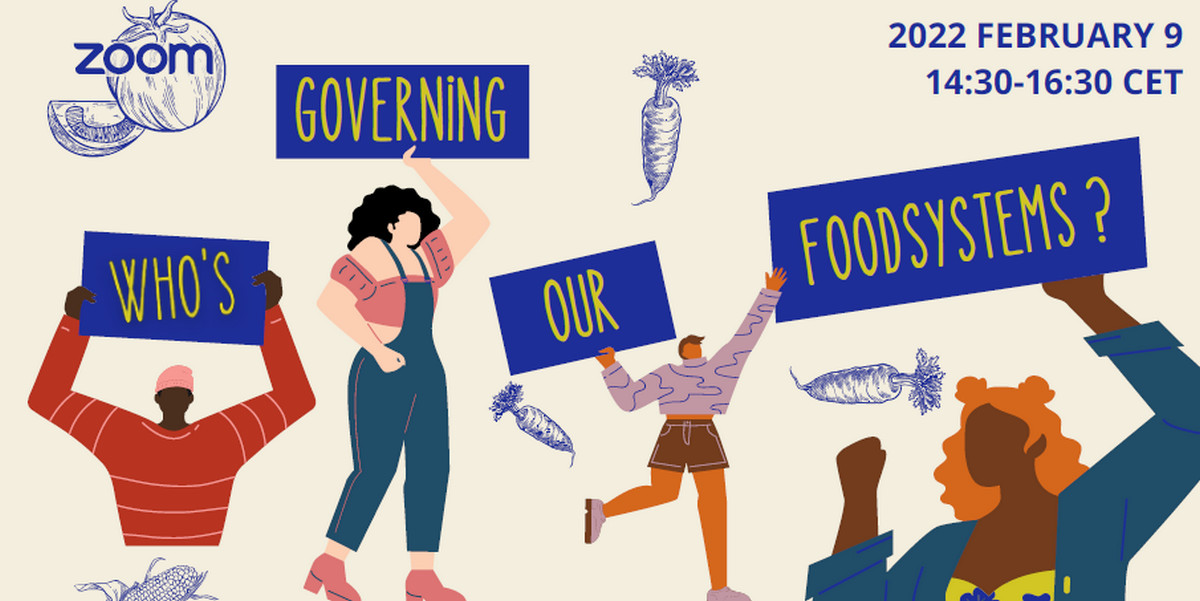ONLINE EVENT – FEBRUARY 9TH 2022 (14:30-16:30 CET)
On February 9th, European members of the Peoples’ Autonomous Response to the UNFSS* are organising a webinar to explore with Members of the EU Parliament how global public food governance is being reconfigured and the main threats compromising its democratic foundations.
It is increasingly recognised that the current food system is not delivering for people and the planet. In 2020, between 720 and 811 million people in the world have faced hunger; which is 160 million more than in 2019. The COVID-19 pandemic, climate change, and unsustainable agriculture & food systems have been critical factors.
The EU recognised that food systems are at once part of the problem and the solution for healthy, sustainable and just societies and the planet.[1] But transforming food systems is not an easy task as changing agricultural practices is not sufficient. All the food system –from the fields to the plates– and the governance of it must evolve. Nevertheless, the pathway of change has raised many questions and disputes regarding how to organise governance and decision-making in ways that are inclusive, democratic, just and lead to sustainable solutions.
Food governance has become a contested political arena since the globalisation of food systems.[2] Interests and power relations of different actors have converged and activated unequal resources to exert their influence in decision-making. International efforts by an ensemble of state and social actors have been concerted for building public regulatory and institutional capacity to promote the right to adequate food and nutrition.[3]
The vision of a public global food governance has been effectively addressed via a system of multilateral coordination for democratic control. Nevertheless, recent initiatives such as the UN Food Systems Summit, risk fragmenting the public sphere that sets the rules, norms and decisions concerning food and agriculture-related policies to make room to private interest which relies on technological fixes, financialisation, public-private partnerships and trade liberalisation, regardless of their consequences for the environment and human wellbeing.[4]
The primacy and legitimacy of the European public sphere to defend what is deemed to be most beneficial for the planet and the people who inhabit it is therefore confronted by an undue interference of corporations in the international and regional policy spaces. The EU’s role to take global leadership in strengthening global food governance upon democratic foundations and inclusive multilateralism is crucial.
The European institutions’ capacity to reinforce the right-holders agency and safeguard the public sphere as the legitimate and accountable space to regulate corporate accountability is practicable under the Farm to Fork strategy, the Sustainable Food System legal framework and the Sustainable Corporate Governance initiative and is needed now.
Representing the European regional stream of the People’s Autonomous Response to the UNFSS, we are organising an online event, on February 9 at 2:30 pm with interested Members of the European Parliament, to trigger a debate around the following question:
“How and to what extent new modalities of global food governance are challenging the public sphere and democratic decision-making for transforming our food systems?”
This event will gather representatives from civil society organisations together EU officials from different Parliament Committees (DEVE, INTA, AGRI) and from various political parties to analyse the actual state of food governance and discuss the role of the EU in the future of food systems.
Contact persons:
• Almudena Garcia i Sastre, EU Policy and Advocacy officer, FIAN. almudena(at)fian-europe.org
• Vincent Dauby, Agroecology and Food Sovereignty officer, CIDSE dauby(at)cidse.org
[1] European Commission. 2020. «A Farm To Fork Strategy For A Fair, Healthy And Environmentally-Friendly Food System». Brussels: COM(2020) 381 final.
[2] McKeon, Nora. 2021. «Global Food Governance». Development 64 (1-2): 48-55. doi:10.1057/s41301-021-00299-9.
[3] Summary Report». 2021. In 49Th Session Of The Committee On World Food Security (CFS 49). International Institute for Sustainable Development. [online] Available at: https://enb.iisd.org/sites/default/files/2021-10/cfs_49_summary_0.pdf.
[4] Clapp, Jennifer, and Doris A Fuchs. 2009. Corporate Power In Global Agrifood Governance. Cambridge, Mass.: MIT Press.
* This event is organised by European members of the People’s Autonomous Response to the UNFSS (UN Food Systems Summit):


